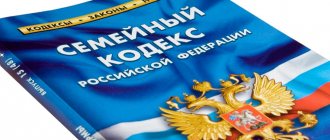Reasons for the emergence of family ties
A family relationship arises on the basis of:
- Consanguinity – based on biological descent from each other, which is confirmed by a birth certificate (children and parents, grandmothers and grandchildren, other relatives, where the relationship from one person to another can be traced).
- Court decisions – adoption of children. At the request of the adoptive parents, the court may decide to register the adoptive parents as the parents of the child they have adopted. Adopted children in relation to their adoptive parents and vice versa are equal in rights and responsibilities to relatives by origin.
- Remarriage is the relationship between children from previous marriages and the new spouse (stepson, stepdaughter and stepfather, stepmother).
The fact of a family connection must be documented in order to take advantage of the right or benefits established by legislative acts.
Confirmation or refutation of a close family relationship may be required:
- upon marriage;
- in the legal regulation of parental rights (deprivation or restriction);
- when paying taxes and state duties upon gift or inheritance;
- during employment, in cases of direct subordination or control.
Criminal law
The Criminal Code, unlike family law, additionally includes spouses in the list of close relatives.
From the point of view of criminal law, all of the above citizens are interested in each other’s fate and are not obliged to give testimony that could harm a loved one.
At the same time, marital relations in their importance are placed on a par with relations between blood relatives, in contrast to family law.
The concept of close relatives
Close relatives are persons between whom kinship arose on the basis of blood ties in an ascending and descending line.
In the ascending line these are children and parents, grandparents and grandchildren. In the descending line, full and half-siblings.
Despite the fact that there is no blood relationship between the adoptive parents and the adopted children, they are close relatives.
Husband and wife are not related. They are in a marriage relationship.
The relationship of the relatives of one spouse to the other and his relatives is a property of kinship. Relatives: father-in-law (mother-in-law) - father (mother) of the husband; father-in-law (mother-in-law) – father (mother) of the wife; son-in-law - husband of a daughter or sister; daughter-in-law (daughter-in-law) – son’s wife, etc.
Persons performing the functions of relatives, but legally are not:
- guardians and wards;
- citizens who are in a de facto marital relationship, but have not officially registered them.
Pedigree - why do I need to know it?
Sometimes knowledge of the principles by which in certain cases persons are defined as close relatives is very important. What are the costs of inheritance disputes and issues of deeds of real estate and valuable property!
By law, close relatives are entitled to the following rights:
- inherit property;
- to refuse to testify against a close relative at trial;
- do not pay property tax when inheriting or receiving as a gift;
- receive leave at your own expense in the event of the death of a close relative;
- other rights provided by law.
Who is a close relative under the law?
The law does not establish a single meaning for the concept of “close relatives”, therefore different rules of law give their own characteristics to “close relatives”.
Family Code of the Russian Federation
Family ties are the most important in family law. Most personal and property relations are based on facts of kinship.
Article 14 of the RF IC identifies the following citizens as close relatives:
- parents and children;
- grandfather grandmother;
- grandchildren;
- full and half brothers and sisters.
Persons who are related are not allowed to marry.
Adopted children, adoptive parents and their relatives are equal to relatives by origin (Article 137 of the RF IC)
Civil Code of the Russian Federation
Important categories of legal relations in civil law are donation and inheritance, in which close relatives have advantages over others.
Chapter 63 of the Civil Code of the Russian Federation, Articles 1142 – 1145 and 1148, provides for inheritance by law in order of priority. The parents, spouse and children of the testator are the first-degree heirs. The heirs of the second stage according to the law are full and half brothers and sisters, grandparents of the testator. Close relatives are called upon first to inherit. In the absence of these heirs, the right to inherit by law is given to the relatives of the testator of the third, fourth and fifth degrees of kinship.
Read more about the order of inheritance by law in the article: Inheritance by law: order of inheritance (scheme)
Tax Code of the Russian Federation
When making a gift, close relatives are exempt from paying tax on income received as a gift.
Criminal procedural and criminal correctional legislation
It is already clearly stated here that close relatives include:
- spouse);
- father and mother;
- son and daughter;
- adoptive parents;
- adopted;
- brothers and sisters, and relatives;
- grandparents;
- grandchildren.
It is noteworthy that Article 51 of the Constitution of the Russian Federation refers to this concept of “close relatives”. It reads: “No one is obliged to testify against himself, his spouse and close relatives, whose circle is determined by federal law.” In this case, federal law means the Criminal Procedure Code of the Russian Federation.
The Code of Criminal Procedure of the Russian Federation separately stipulates the conduct of procedural actions with the participation of close people. For example:
- The interrogation of a minor is carried out only in the presence of his legal representative (parent).
- A citizen has the right not to testify against a relative in court and during investigative actions.
- Legal spouses, as well as blood relatives, have the right to visit their loved one in a correctional facility. While it is difficult for a cohabitant or another person to get a date.
Which relatives are considered close
Husband and wife
A husband and wife are not considered close relatives because they are not related by blood. When entering into a marriage relationship, spouses are endowed with mutual rights and obligations for mutual material support (Clause 1 of Article 89 of the RF IC). The following have the right to demand maintenance:
- disabled needy spouse;
- wife during pregnancy and for three years from the date of birth of a common child;
- a needy spouse caring for a common disabled child until the child reaches the age of eighteen or a common child who has been disabled since childhood, group I.
After the death of the husband, the wife is included in the circle of first-line heirs. In case of divorce, the spouse has the right to receive half of the property acquired during the marriage.
Full and half siblings
When inheriting by law, this category of persons belongs to the heirs of the second stage. If the heirs of the first stage are absent, have refused the inheritance or are recognized as unworthy, the heirs of the second stage are called upon to inherit. Half brothers and sisters have all the rights and responsibilities of full brothers and sisters.
Full and half-siblings (having a common father or mother) brothers and sisters (clause 18.1 of article 217 of the Tax Code of the Russian Federation; article 2, paragraph 3 of article 14 of the RF IC) are exempt from paying personal income tax when receiving any gift. For the issuance of a certificate of the right to inheritance by law and by will, they pay less state duty than other categories of heirs.
Cousins
During inheritance, cousins are considered relatives of the testator, but inherit by right of representation in the event of the death of their parents.
Grandmother and grandfather
Grandparents are close relatives to their children and grandchildren and are second-degree heirs.
Stepfather, stepmother and stepson, stepdaughter
This category is not related by blood and legal rights between them arise upon entering into inheritance. They are heirs of the seventh order and are called upon to inherit if there are no heirs of previous orders.
Mother-in-law and father-in-law, mother-in-law and father-in-law
Mother-in-law, father-in-law, mother-in-law and father-in-law are close relatives with their children, but in relation to the husbands and wives of their children they are not. There are no mutual rights or obligations between them. If they live in the same apartment they become family members.
Civil marriage
Is a wife legally related to her husband? As a rule, they do not talk about biological kinship in the legislation of the Russian Federation. Can spouses be considered related to each other in a legal sense?
No, if we are talking about living in a civil marriage. More precisely, about cohabitation - when a couple lives together, leads a common life, sometimes even has children, but their relationship is not officially registered in the registry office.
Accordingly, the spouse in such a marriage will lose many rights offered by the state to official husbands and wives. But more on that a little later. To begin with, it is necessary to find out whether persons who entered into a marriage can be considered relatives.
Family ties during inheritance
The testator, at his own discretion, has the right:
- bequeath property to any persons;
- determine the shares of heirs;
- disinherit heirs by law without specifying reasons;
- revoke and change a will.
Article 1149 of the Civil Code of the Russian Federation establishes the right to an obligatory share in the inheritance for the following category of relatives and dependents:
- minor or disabled children of the testator;
- disabled spouse and parents;
- disabled dependents.
This category of relatives inherits, regardless of the contents of the will, at least half of the share that would be due to each of them if inherited by law.
The amount of state duty for performing notarial acts
The amount of the state duty for issuing a certificate of the right to inheritance by law and by will depends on the degree of relationship between the testator and the heirs (Article 333.24 of the Tax Code of the Russian Federation):
- children (natural and adopted), spouse, parents, full brothers and sisters pay 0.3 percent of the value of the inherited property, but not more than 100,000 rubles;
- other heirs pay 0.6 percent of the value of the inherited property, but not more than 1,000,000 rubles.
Documentary confirmation of the relationship with the testator is necessary.
Do I need to pay tax on an apartment donated by my mother-in-law to my daughter-in-law?
Based on subparagraph 7 of paragraph 1 of Article 228 of the Tax Code of the Russian Federation (hereinafter referred to as the Code), individuals receiving from individuals who are not individual entrepreneurs income in cash and in kind by way of gift, except for the cases provided for in paragraph 18.1 of Article 217 of the Code When such income is not subject to taxation, they independently calculate and pay the amount of personal income tax. In accordance with paragraphs 1 and 2 of clause 18.1 of Article 217 of the Code, income in cash and in kind received by taxpayers from individuals as a gift is not subject to personal income tax, with the exception of cases of donation, including real estate.
Please note => Personal account of the pension fund for individuals
Answers to the question:
Similar questions (read more...)
24. The originals of the documents specified in paragraphs 19.3, 19.5, 19.7, 20.1 - 20.8, 21.3 - 21.5, 21.8, 22.3, 22.6, 23.3 - 23.5 of the Administrative Regulations must be returned to the applicant, and their copies and a notarized translation into Russian provided by the applicant are attached to the application.
If the statement is not confirmed by the results of expensive examinations, any competent lawyer can challenge such a claim, calling into question the fact that the listed problems are caused by neighbors smoking.
Spouses and their parents
Mother-in-law is the husband's mother. The origin of this word means "one's own blood".
Mother-in-law is the mother of the wife. It is about the mother-in-law and her relationship with her son-in-law that there are a huge number of jokes that ridicule their mutual enmity and hatred. But there are also proverbs about the good relationship between mother-in-law and son-in-law, for example: “A good mother-in-law has a son-in-law as her most beloved son.”
Matchmaker is the father of one of the spouses in relation to the parents of the other spouse. About a person who has gained trust, they say “both matchmaker and brother.” There is also a saying: “A brother is a brother, a matchmaker is a matchmaker, but money is not relatives.”
Matchmaker (not to be confused with matchmaker) is the mother of one of the spouses in relation to the parents of the other spouse. Pushkin's in-law Babarikha is in fact the mother of all three girls who were spinning late in the evening, so her hatred of her third sister and her own grandson is difficult to explain. Further in the text of the tale, Pushkin confirms this in the episode where Prince Guidon turned into a mosquito and bit his in-law woman on the nose: “But he pities the eyes of his old grandmother.”
Matchmaker is a woman involved in matchmaking and arranging marriages. A profession that has disappeared these days, but was very in demand in the past.
Have you ever experienced delays in child support payments?
Not really
Son-in -law is the husband of a daughter, sister, or sister-in-law. In other words, a son-in-law is a man in relation to his wife’s family: her parents, brothers, sisters.
Daughter-in-law is the wife of a son, brother, brother-in-law. In other words, a daughter-in-law is a woman in relation to her husband’s family: his parents, brothers, sisters.
Daughter-in-law (son) is the wife of a son in relation to his father (father-in-law) and mother (mother-in-law). In Vysotsky’s song “A Trip to the City” there are the words: “so that I can bring my daughter-in-law and her husband a doha.” If the daughter-in-law is the son’s wife, then “her husband” is the son of the main character of the song.









